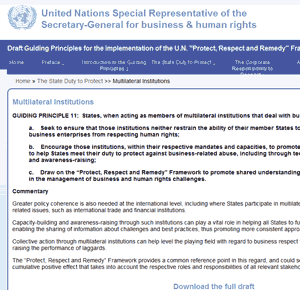 An example page, showing discussion and
An example page, showing discussion and agreement at the bottom. Click to enlarge.
Last week, the United Nations Special Representative on Human Rights, John Ruggie, released the draft “Guiding Principles for the Implementation of the UN ‘Protect, Respect and Remedy’ Framework” for consultation.
Businesses and stakeholders have the opportunity to comment on them up until the end of January 2011, after when they will be prepared for formal presentation to the UN Human Rights Council later in the year.
The framework contains 29 principles which rest on three foundations:
- the state’s duty to protect human rights
- business’ responsibility to respect human rights
- free access to meaningful remedy where breaches occur
The full document can be read in PDF format here, or viewed online here. The online representation doubles up as a forum, with registered users able post comments after each principle which other users able to rate as relevant and show their agreement (or disagreement).
This is a rather neat and straightforward way of collating opinion and I hope other consultations take note! Real respect to the University of Western Ontario, whose fourth year design students are apparently responsible for it.
For your convenience, here’s a potted summary of some of the most important statements:
Principle 5: governments should encourage and where necessary require businesses to respect and report upon their human rights activities; they should not presume that businesses prefer or benefit from state inaction
Principle 10: governments should be prepared to withdraw public support from businesses involved in gross human rights abuses if they fail to address the situation
Principle 11: multilateral institutions (eg. the IMF) should not constrain governments’ ability to act on human rights and should use these guidelines to foster mutual understanding between their members
Principle 12/13: businesses should have in place appropriate policies and process based (as a minimum) on the International Convention on Human Rights and the International Labour Organisation’s core conventions
Principle 14: businesses’ commitment should include approval from the most senior level of the organisation, be communication to all staff, partners and stakeholders and make clear the company’s expectations of staff and partners alike
Principle 15/16/17: businesses should have a due diligence process ongoing which will identify human rights risks and impacts and feed these into standard decision making processes
Principle 18/19: businesses should track their human rights performance and be prepared to discuss their record publicly with relevant stakeholders
Principle 23/24/25: governments have to ensure that human rights abuses in their territories are met with effective and enforceable judicial and non judicial remedies and mechanisms
Principle 27/28: businesses should establish grievance mechanisms for communities who may be adversely impacted by their operations and participate in cross industry and multi-stakeholder initiatives
All in all there’s nothing too shocking in these guidelines although there are a few places where the information provided needs to be finessed. Generally speaking, it can be assumed these Guidelines will go forwards as presented.
This also presents a golden opportunity for businesses to steal a march on their competitors and build new functionality into their websites. Not just to report their human rights record, but also to collate information and participate in collaborative schemes.
A former CTO, Chris has a broad and varied background. He’s been involved with blue chips, consultancies & SMEs across a wide variety of sectors and has worked in Europe, the Middle East and Australia.
In 2007 he decided to combine his knowledge of business and IT with his passion for all things sustainable and has been busy writing ever since. However, his greatest ambition remains to brew the perfect cup of coffee.

